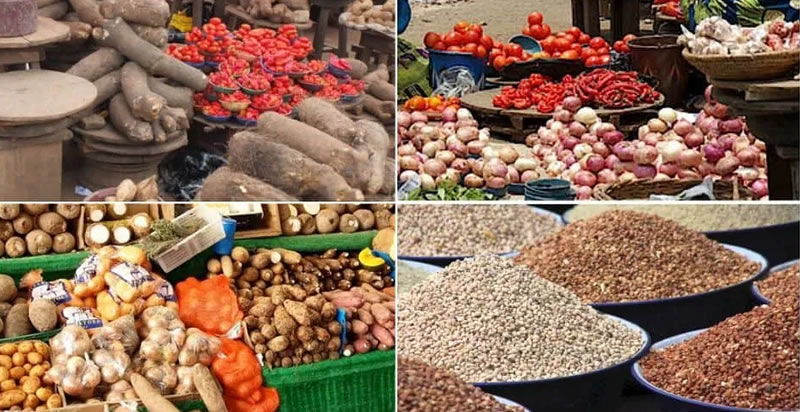Fact Check: No evidence showed that people traveling through Sahara dessert are Nigerians
You can read this Fact Check on our verification platform Here Please note that thefactwatch is a verification platform owned by CrimeFacts news

You can read this Fact Check on our verification platform Here Please note that thefactwatch is a verification platform owned by CrimeFacts news

THE Federal Government has revealed that it has in the last one year uncovered 1,618 officers in the Civil Service with illegal and fake employment letters and have been deleted them from the Integration Personnel Payroll and Information System (IPPIS). Head of Civil Service of the Federation, Dr. Folasade Yemi-Esan made this known on Wednesday in Abuja, during a media parley organized as part of programmes marking the 2024 Civil Service Week, with a theme: Education an African fit for the 21s Century: Building Resilient Education System for Increased Access to Inclusive Longlife, Quality and relevant Learning in Africa. She disclosed that through physical verification conducted by the Ministries, Departments and Agencies (MDAs) of Government, the once over-bloated federal civil service has now been brought down from over 100,000 to 69,308 who have been verified and are on the payroll. Yemi-Esan revealed that apart from the ghost workers who were parading fake employment letters, there was also the issue of some civil servants who “japa” for greener pastures in overseas that were caught napping during the physical verification exercise. According to her, some of them who came into the country for the verification exercise like one or two weeks after the exercise had been conducted under the pretext that they were not aware of the scheduled physical verification exercise, were graciously given two weeks to appear for the verification exercise. Curiously, the Head of Civil Service of the Federation, said instead of waiting for the two weeks in addition to the days they had already spent in Nigeria, “a lot of them tendered their resignation letters because no UK organization would afford to give two additional weeks in the country to perfect the verification process. On the issue of endemic corruption in the public service, Yemi-Esan said her office has been working in synergy with the Independent Corrupt Practices and Other Related Offences Commission (ICPC) and Economic and Financial Crimes Commission (EFCC) in ensuring that underhand dealings were eliminated from the system. She also spoke on the efforts to reposition the Federal Civil Service for optimum and quality service to Nigerians, while expressing confidence that by the end of 2025, the entire service would be fully digitized. Yemi-Esan disclosed that significant progress has made by the current administration to transform and digitize work processes. “From the service wide perspective, all MDAs, all other ministries are also running with the digitalization programme and there are different stages of implementation, but they have a mandate for all to achieve full migration by the end of 2025,” she said.

A popular tap-2-earn app, Tapswap, powered by TON Blockchain, has said the token allocation to users has been indefinitely postponed as the representatives are seeking the best ways to reward the tap-to-earn gamers. This was disclosed by a Head of Communications, Tapswap, John Robbin, on an X space on Wednesday. The app, which required users to repeatedly tap the icon in the centre of the Telegram Tapswap bot screen to mine coins, recently gained momentum among Nigerians tapping on their phone screens in pursuit of financial earnings and has amassed over 50 million users since it launched on February 15, 2024. According to him, the method of token allocation has not yet been ascertained, stressing that the processes cannot be communicated before the allocation. “The token launch was postponed until July 1. The new date will be communicated. “We will allocate a significant part of the tokens to the community to retain the tappers. We want you all to be part of the tapswap community. “We need a token airdrop to be a win-win for all of us. We have started communicating with many exchanges and platforms,” Robbin said. The app’s communication head also noted that those using the mechanism to farm taps and abuse the game would be banned by running checks from the community members while seeking genuine tappers’ patience. Speaking on the mining processes, he said, “Just open the app and tap on it; that will give you shares. The more you tap and the more upgrades you do, the more shares you will have when we finalize the tokens on it. “The more tokens you want to have, the more tapping you have to do.” On the booster option, which has already ended, the representative said it was not something new, adding, “We have room exponentially faster than we thought, and then to develop the game plan further, we introduced a paid feature to make their capital, but it was not mandated on the users. “We introduced the limited x2 donation because the new influx of users kept coming in, and we needed them to make something out of it and get a fair allocation at TGE. “It was a platform that allowed people who joined recently to compete with people who started earlier. It is gone for now, but we are looking forward to using the money we earned from it to improve the game in the future. “It is all going to our 25 staffers working around the clock to sustain the app. We want to be here for a very long time.” He also urged people to continue joining the tapping app as there’s time for them to get an appreciable token. Recall that Nigerians, including young and old, have been obsessively tapping on their phones, with some asserting to be waiting for the tokens to be allocated to buy cars and houses of their choice from the many taps they have accumulated. In a viral clip, a Keke driver was seen tapping away on his phone with one hand while simultaneously steering his moving vehicle and transporting passengers. Another viral video showed several traders in Northern Nigeria tapping vigorously on their screens.

A young man identified as Endwell Ejindu has been shot dead in Rivers State. The incident occurred in the Ahoada East Local Government Area of the state on Tuesday. Ejindu was the Student Union Government (SUG) President of the Elechi Amadi Polytechnic, Port Harcourt, during the 2017/2018 academic season. Details gathered suggest he was part of the youths who protested at the council headquarters on Tuesday as a viral social media video showed him chanting songs and waving an Ijaw Youth Council flag alongside some youths. Though details are sketchy, eyewitnesses said while on a commercial motorcycle, he was shot at close range by unknown assailants along the Ula-Upata Road in Ahoada main town at about 9pm on Tuesday. The Rivers State Police Command has not commented on the issue as of press time. Ejindu’s death brought the number of lives lost in the state in the past 24 hours to three. A cop and a vigilante operative were shot dead at Eberi-Omuma on Tuesday.

A 22-year-old newlywed bride was among the casualties of the attacks by gunmen in Anambra communities. On Monday, gunmen invaded Nnewichi community in Nnewi north LGA and Nnobi community in Idemili south LGA of the state, shooting sporadically and destroying properties. The attackers were said to be enforcing a sit-at-home order in the south-east region. Tochukwu Ikenga, Anambra police spokesperson, confirmed that the 22-year-old lady was among the three victims of the attack. According to reports, the victim was also the only child of her parents. A family source told Punch that she had her traditional marriage only a week ago and was waiting for her husband who lives abroad to return before she was hit by stray bullets. “It was a heartbreaking incident and a heavy blow on the family yesterday (Monday). Her mum sent her to their farm to bring vegetables for the preparation of their food. On her way back home, she was hit by stray bullets during the gunfire between security officials and those dare-devil criminals,” Punch quoted the source as saying. Ikenga said doctors declared the lady, and two other victims, dead after police operatives took them to the hospital. “Two others are currently receiving treatment,” the state police spokesperson said. So far, no arrest has been announced. Ikenga said Nnaghe Itam, the state commissioner of police, has ordered an immediate manhunt of the gunmen.

The Director General of the National Agency for Food and Drug Administration and Control, Moji Adeyeye said the ban on the sale and consumption of sachet alcoholic beverages in the country is still in force. According to Punch, Adeyeye said this on Wednesday at a press briefing held in Lagos.. She said, “The ban on sachet alcohol is a ministerial directive and the ban still remains until the ministers respond. The meeting last week Thursday is a continuation of the discussion. “The outcome of the meeting is that the ministers should write a memo to the Speaker (of Reps) and the House (of Reps), and the Representative of the Speaker, Prof Jake Dan-Azumi then said we should continue the discussion after the recess of the House members in July. So, the discussion continues.” The deputy spokesman for the House of Representatives, Philip Agbese, last Friday disclosed the House and NAFDAC resolved to lift the ban on the sale and consumption of sachet alcoholic beverages in the country. Agbese said the resolution to lift the ban temporarily was arrived at after a meeting between the House Committee and NAFDAC officials, noted He said the lifting of the ban would end when the economy fully recovers from its current strain. On February 1, 2024, NAFDAC commenced the enforcement of the ban on the importation, manufacture, distribution, sale and use of alcoholic beverages in sachets, PET, and glass bottles of 200ml and below. The NAFDAC DG said the decision was based on the recommendation of a high-powered committee of the Federal Ministry of Health, NAFDAC, Federal Competition and Consumer Protection Commission, and the industry represented by the Association of Food, Beverages and Tobacco Employers, Distillers and Blenders Association of Nigeria, in December 2018. However, the move to enforce the ban has generated repeated protests by distillers and labour unions, who said the ban would cost 500,000 workers their jobs, and ruin N800bn investments. Meanwhile, medical experts warned that lifting the ban on alcoholic beverages will lead to acute health complications, increased road traffic accidents, increased risk of abuse of alcohol, liver problems, heart-related problems, and cancers, among others.

The Leader of the proscribed Indigenous People of Biafra (IPOB), Nnamdi Kanu, has told the Federal High Court Abuja that he will, under section 17 of the Federal High Court Act, seek negotiations with the Federal Government. Kanu has been in DSS custody since June 2021 when he was arrested in Kenya. Since his arrest, he has been facing terrorism-related trial levelled against him by the Federal Government. Section 17 of the Federal High Court Act states that “In any Proceeding In the court, the court may promote reconciliation among parties thereto and encourage and facilitate the amicable settlement thereof”. Speaking through his lead counsel, Alloy Ejimakor, Kanu made this known in open court on Wednesday after he moved two applications brought before the court. The first application is to move form 49 and an application objecting to the jurisdiction of the court. Ejimakor said if the applications are denied they will move for the implementation of section 17 of the Federal High Court Act. Responding to this, counsel to the Federal Government, Adegboyega Awomolo, told the court that he had earlier informed the defendant that he does not have the powers to negotiate on behalf of the Federal Government, as the fiat given to him does not empower him to negotiate. He added that the defendant should approach the Attorney General of the federation. In her reply, Justice Binta Nyako said the court was not a solicitor, but to only hear cases. We are all for peace Kanu, who arrived in court in the presence of his lawyers on Wednesday, also spoke on the killings in the South-East. He insisted he was all for peace, and had no hand in the murder of the some soldiers in Abia State a few weeks ago. “I condemn in its entirety all of the killings, because IPOB was founded on a non-violent principle, and we maintain that stand. And some of these soldiers, we were told are also our people, and his family is in mourning right now. “So I condemn all the killings. I don’t want that. We are fighting for freedom, so, how can we want violence? We want people to be free. We have suffered a lot in Africa, from slavery in Arabia, Europe and now slavery in America. “This is when to focus on this continent, and be what God wants us to be, so that they will know that we know what we are doing,’ he told journalists in court.

The Federal Government of Nigeria is set to send the first citizen to space. The Director General, National Space Research and Development Agency, Dr Mathew Adepoju disclosed this at a press conference in Abuja on Wednesday. The FG signed the Memorandum of Understanding in a collaboration between NASRDA and The Space Exploration and Research Agency. The DG noted that “This collaboration, which is coming to the country, marks a significant milestone in Nigeria’s 25th anniversary of Space Exploration journey and opens new opportunities for scientific research and technological advancement.” Details later…

Following the barrage of political crises currently tearing its political fabric apart, the All Progressive Congress (APC) chapter in Rivers State, has called for declaration of a state of emergency in the state. Details soon…

The United Nations World Food Programme has announced plans to support Nigeria and seven other West and Central African countries with food in the wake of spreading hunger, shortages of food items, and soaring prices. In a statement posted on its website on Tuesday, the United Nations food body listed Nigeria, Cameroon, Central African Republic, Chad, Mali, Mauritania Burkina Faso and Niger as the beneficiaries of the food initiative. The statement read, “We are ramping up our lifesaving food and nutrition assistance programme in West and Central Africa, targeting 7.3 million people during the ongoing June-August lean season when food stocks run out and hunger peaks. The programme which kicks off in June, supports national governments’ lean season response plans in Burkina Faso, Cameroon, Central African Republic, Chad, Mali, Mauritania, Niger, and Nigeria.” “The number of people World Food Programme will target as part of the programme could expand to 12 million people if adequate funding allows. But dwindling resources available for humanitarian operations means that despite near-record level needs, WFP has been forced to assist less people than originally planned. “West and Central Africa is in the grips of a severe food security and nutrition crisis – with nearly 55 million people projected to face acute hunger during the June-August lean season – a fourfold increase on the 12.6 million people facing acute hunger in 2019. Malnutrition has also reached extraordinary levels, with an estimated 17 million acutely malnourished children under five,” the statement stated. On his part, WFP’s Regional Director for Western Africa, Chris Nikoi, said, “The alarming hunger crisis in the region underscores the urgent need for transformative solutions to help vulnerable families meet not only their immediate food needs but also build a brighter future. “We need to continue prioritising emergency response for those most in need. But we need more investment in sustainable solutions to help strengthen food security, improve agricultural productivity, purchasing power of families at the right time, and cushioning economic and climate shocks,” Nikoi added. “The hunger and nutrition crisis in West and Central Africa is driven by the intertwined impacts of conflicts, high food prices, and the impacts of the climate crisis. Economic shocks linked to market disruptions, high inflation and weakened economic activities, depreciating national currencies and increasing costs of fuel and agricultural inputs have inflicted a significant toll on people – particularly in Nigeria, Ghana, and Sierra Leone. “WFP’s lean season response aims to meet the immediate food and nutrition needs of those most exposed to acute hunger – including refugees, the most vulnerable displaced people, severely food insecure people, and people in blockaded areas adversely impacted by climatic, economic and security crises. “While the crises continue to increase in magnitude, frequency, and complexity in the region, funding to respond has not kept apace – leaving even some of those facing the most acute needs without assistance. As a result, millions of food insecure families are left without assistance, and at risk of sliding further into the most severe levels of hunger next year. “This is especially worrying as the 2024 seasonal forecasts paint a grim picture of both dry spells and floods in parts of the region, potentially disrupting farming and livestock productivity, prolonging the next lean season, and exacerbating the vulnerability of hard-hit communities,” the statement warned. “The escalation of humanitarian needs far outstrips available resources. The only way out of this cycle is to prioritise as well durable solutions,” Nikoi insisted